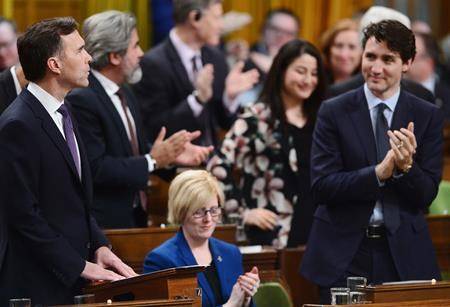The federal Liberals will ask a group of advisers, led by Ontario’s former health minister, to explore options for a national program to cover the cost of prescription drugs and report back in 2019 — ensuring pharmacare becomes a key election campaign issue.
The measure forms a part of a trinity of major drug initiatives in Tuesday’s federal budget, the other two being a $231-million package of steps that aims to confront Canada’s escalating opioid crisis, including $150 million in emergency funding, and tax changes for cannabis-based pharmaceuticals.
READ MORE: B.C. welcomes Ottawa’s help on rental housing construction
Former Ontario health minister Eric Hoskins will head up an advisory council to come up with options on how to create a national pharmacare program — a program that the parliamentary budget watchdog has warned could cost $19 billion a year.
The work will include consulting with provinces, territories and Indigenous groups about what drugs should be included, and the costs involved for “whatever model that we choose,” Health Minister Ginette Petitpas Taylor said after the budget speech with Hoskins at her side.
Hoskins won’t have to deliver a final report until the spring of 2019, setting the stage for the Liberals to make pharmacare a centrepiece of the party’s election campaign and take a key talking point away from NDP Leader Jagmeet Singh.
Following Finance Minister Bill Morneau’s speech, Singh seemed unfazed by the prospect, noting that the Liberals were only promising to examine the issue. He even dared the government to steal his party’s proposal and implement a national pharmacare plan.
“What the government is proposing is not a plan. This is a fantasy,” Singh said. “We want to introduce a program now.”
Conservative Leader Andrew Scheer said “Canadians should brace themselves” about what might come, because a former Ontario Liberal cabinet minister shouldn’t be trusted to craft “any kind of plan, never mind one in the health care field.”
In the meantime, the Liberals say they won’t apply new sales taxes to cannabis-based pharmaceutical products that can be obtained with a prescription.
Nor will taxes be applied to oils that contain low amounts of THC, the primary psychoactive element in marijuana, that are used by children with certain medical conditions.
But those medications represent a minority of those used by patients, according to one group. Canadians for Access to Medical Marijuana also questioned the wording behind a budget promise to consider retroactively reimbursing patients an unspecified amount for taxes already paid on cannabis-based pharmaceuticals.
“Exempting a small minority of patients does not address the affordability issue and implies some patients are more legitimate than others. Looking into a reimbursement program implies patients can afford to pay for their medicine in the first instance. They can’t,” director Jonathan Zaid said in a statement.
The Opposition Conservatives have chided the government for moving too fast on legal pot, suggesting there are outstanding public safety issues that need to be addressed.
The budget outlines $62.5 million over five years beginning this year for public education programs around cannabis use, and a further $20 million over five years for research by the Mental Health Commission of Canada and the Canadian Centre on Substance Use and Addiction.
The Liberals are also spending $80.5 million over five years starting this year to reduce tobacco use, particularly in Indigenous communities, and raising taxes on cigarettes by $1 per carton.
On opioids, provinces and territories will receive $150 million in emergency funding this year to deal with a crisis that is projected to claim more than 4,000 lives this year.
The balance of the $231.4 million will go towards public education campaigns, better access to public health data and new equipment and tools to allow border agents to better detect dangerous opioids like fentanyl before they enter the country.
— With files from Geordon Omand and Lee Berthiaume
Jordan Press, The Canadian Press



